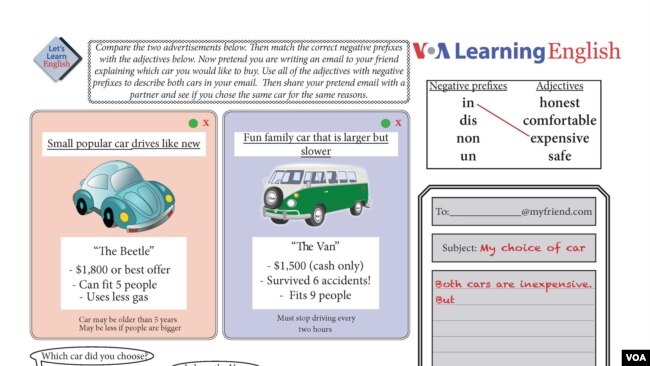Summary
Anna sees an ad for a hair product on television. Her friend Pete is in the ad, so she believes that the product is a good one. She learns that she cannot believe everything she sees in television ads.Speaking
In this video, learn how to say the new words. Then learn about using negative prefixes with adjectives.Conversation
Anna: Hello! Winter weather in Washington, D.C. can be really
windy. And wind messes up my hair. It is really windy today. Look at my
hair. Will it be windy this weekend? I’ll listen to the news. I am tired
of my untidy hair.
Pete: Are you tired of your untidy hair?
Anna: Yes. Yes, I am. And it’s … uncomfortable.
Pete: Is it … uncomfortable?
Anna: Yes. Yes, it is! Hey, is that … Pete?
Pete: Hi. I’m Pete. And I have the perfect product for you -- Hair Be Good!
Pete: Just spray Hair Be Good on your hair … wrap in a towel … and you are done! Hair Be Good works and it’s inexpensive. One can costs only $10! So, go online and order your Hair Be Good today!
Anna: Hair Be Good sounds perfect! And I can trust Pete! I am buying some right now. Okay, I will order one can of Hair Be Good for $10. I’ll pay with a credit card. My delivery will arrive in 2 days. Awesome!
Anna: It arrived! I'll use it before I go to work. Okay, Hair Be Good, make my untidy hair tidy! No, make it … fabulous!
Amelia: Hi, Anna.
Anna: Hello, Amelia!
Amelia: Anna, you look … different.
Anna: Thanks! I used a new product called Hair Be Good.
Amelia: Well, it’s not.
Anna: It’s not what?
Amelia: Good. Your hair does not look good.
Anna: Oh, no! This is not good.
Amelia: Why don’t you go home and take care of … this.
Anna: Good idea.
Pete: Hi, Anna!
Anna: Hello, Pete.
Pete: Is something wrong?
Anna: This is wrong!
Pete: What did you do to your hair?
Anna: Hair Be Good did this to my hair.
Pete: Ah, you bought it!
Anna: Yes, I bought it. You said in your ad it was a perfect product. This is not perfect. This is imperfect!
Pete: It’s unbelievable!
Anna: I believed your ad, Pete. It was dishonest!
Pete: Anna, you don’t believe everything you see in ads, do you?
Anna: No, Pete. Just the ones with my friends.
Pete: Your hair will be okay. Just wash it ... a couple of times.
Anna: Thanks. Thanks a lot, Pete! Here, here's your product! You
should call it "Hair Be Really Bad!" Until next time, Pete! Till next
time.
Writing
In this lesson, Anna believed an ad she saw on television. It was not a good decision. Do you believe the ads you see on television? Why or why not? Write to us by email or in the Comments section.Click on the image below to download the Activity Sheet and practice talking about ads.

Activity Sheet Lesson 39
Learning Strategy
Learning Strategies are the thoughts and actions that help make learning easier or more effective.The learning strategy for this lesson is Asking Questions to Clarify. When we try to get more information we ask clarification questions. The information may help us to better understand others.
In this lesson, Anna asks Amelia to clarify. Amelia says, "Anna, you look … different." Anna thinks she looks great. She tells Amelia about the new hair product: "Thanks! I used a new product called Hair Be Good."
When Amelia says, "Well, it’s not," Anna asks a question to clarify: "It’s not what?" Amelia clarifies, or explains her meaning: "Good. Your hair does not look good."
Do you ever ask questions to clarify when you speak English? Write to us about it in the Comments section or send us an email. Teachers, see the Lesson Plan for more details on teaching this strategy.
No comments:
Post a Comment